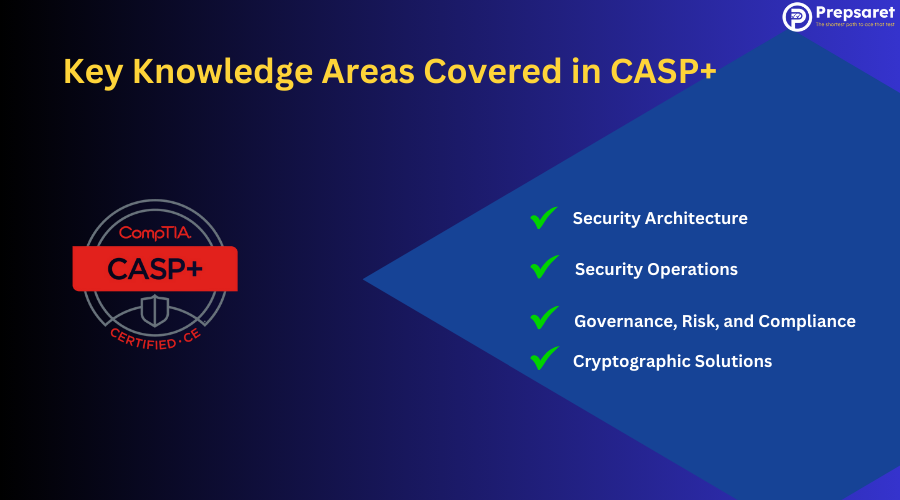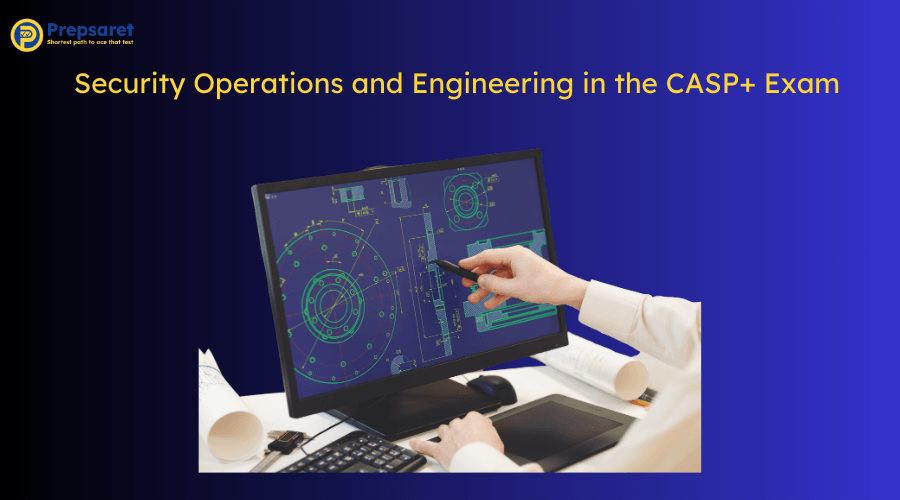CompTIA CASP+ Exam Objectives
If you’re gearing up for the CompTIA CASP+ exam, you’re in for a challenge—but don’t worry, we’ve got your back!
The CASP+ (CompTIA Advanced Security Practitioner) certification is a high-level cybersecurity certification designed for professionals who want to prove they can handle complex security solutions in enterprise environments.
Acing this exam starts with understanding its objectives, and that’s exactly what we’re diving into today. We’ll break down the CASP+ certification objectives, explain why they matter, and show how they align with real-world cybersecurity roles.
By the end, you’ll have a clear roadmap to mastering the CASP+ exam. Ready? Let’s go!
Who Should Take the CompTIA CASP+ Exam?
The CASP+ certification is tailored for mid-to-senior level cybersecurity professionals looking to validate their technical expertise in advanced security practices.
Unlike other certifications that focus on management and policy, CASP+ is hands-on, making it ideal for those who work directly with cybersecurity architecture and operations.
Ideal Candidates for CASP+
- Security Architects – Design secure enterprise environments.
- SOC Analysts – Monitor and respond to cybersecurity threats.
- Penetration Testers – Identify and exploit vulnerabilities in systems.
- Cybersecurity Engineers – Develop and implement security solutions.
Recommended Experience
CompTIA recommends at least 10 years of IT experience, with five years in security before taking the CASP+ exam. While it’s not a strict requirement, having practical experience with enterprise security concepts will make the exam significantly easier.
Overview of CompTIA CASP+ Exam Domains and Objectives
The CompTIA CASP+ syllabus covers four major domains, each testing a crucial aspect of enterprise cybersecurity. Here’s a high-level look:
| Domain | Percentage of Exam | What It Covers |
| Security Architecture | 29% | Designing secure enterprise environments, risk management, and security controls |
| Security Operations | 30% | Security assessments, incident response, and vulnerability management |
| Cryptographic Solutions | 20% | Implementing and managing encryption technologies |
| Governance, Risk, and Compliance | 21% | Security policies, legal regulations, and risk management |
Understanding these CASP+ exam domains will help you focus your study efforts and ensure you’re prepared for the types of questions on the exam.
Key Knowledge Areas Covered in CASP+

Each domain assesses a range of skills needed to work in enterprise security:
- Security Architecture – Designing secure networks and applications
- Security Operations – Conducting threat analysis and risk mitigation
- Cryptographic Solutions – Implementing encryption and PKI
- Governance, Risk, and Compliance – Ensuring regulatory and policy adherence
Now, let’s dive deeper into the core areas of the CompTIA CASP+ exam objectives PDF and how they relate to practical cybersecurity roles.
Security Architecture: A Core Focus of the CASP+ Exam
Security architecture is one of the most critical domains in CASP+, making up 29% of the exam. This section tests your ability to design and implement security solutions that protect enterprise environments.
What You Need to Know
- Security governance frameworks (NIST, ISO 27001, CIS)
- Network security architectures (zero trust, microsegmentation)
- Cloud security solutions (hybrid, public, and private cloud security)
- Application security controls (secure coding practices, OWASP Top 10)
Real-World Applications
Imagine you’re a security architect for a large corporation. Your company is migrating to the cloud, but executives are worried about data breaches.
You need to design a hybrid cloud security strategy that meets compliance standards and protects sensitive data. This is the type of scenario CASP objectives PDF prepares you for!
Continue reading: CompTIA CASP+ Certification
Security Operations and Engineering in the CASP+ Exam

Security operations cover threat detection, response, and mitigation—key areas in enterprise cybersecurity. This domain makes up 30% of the exam and focuses on practical security measures.
What You Need to Know
- Vulnerability assessments (scanning, reporting, remediation)
- Threat intelligence (TTPs, attack indicators, threat hunting)
- Incident response and forensics (containment, eradication, recovery)
- Automation and orchestration (SIEM, SOAR, AI-driven security)
CASP+ vs. Other Certifications
One common question among cybersecurity professionals is CASP vs CISSP. While both certifications are advanced, CISSP is more management-focused, whereas CASP+ emphasizes hands-on security implementation.
If you’re looking for a certification that validates technical expertise rather than governance and policy, CASP+ is the better fit.
Read on: CompTIA CASP+ vs CISSP: Which is Better?
CompTIA CASP+ Exam Cost and Salary Expectations
The CompTIA CASP+ exam cost is approximately $494, making it a relatively affordable option for an advanced-level certification.
Additionally, professionals with CASP+ certification can expect competitive salaries, with the CompTIA CASP+ salary averaging around $90,000–$130,000 per year, depending on experience and location.
How CASP+ Fits Into the CompTIA Certification Path
CASP+ is an advanced-level certification, but understanding foundational cybersecurity concepts is essential before attempting it.
Many professionals start with the CompTIA Security+ SY0-701 exam objectives, then progress to CompTIA Network+ exam objectives before tackling CASP+.
This structured approach ensures you build a strong knowledge base before diving into advanced security concepts.
Related: CompTIA Stackable Certifications
Cryptographic Solutions and Risk Management
The CompTIA CASP+ syllabus includes encryption technologies, secure communications, and risk management practices. The CASP+ exam blueprint ensures candidates can implement security solutions effectively while aligning them with business objectives.
You’ll be tested on:
- Implementing PKI and certificate management
- Deploying encryption for data at rest and in transit
- Assessing risk and aligning security controls with business goals
This falls under the CompTIA CASP+ domains breakdown, which ensures cybersecurity professionals can protect sensitive data while balancing security and business needs.
Cryptographic Solutions and Their Role in CASP+

Let’s talk about cryptography—the secret sauce of enterprise security! If you’ve ever used encryption to protect data, sent a secure email, or even made an online payment, you’ve already interacted with cryptographic techniques.
The CASP+ certification guide highlights cryptographic concepts tested in the exam, including:
- Encryption Techniques – Symmetric vs. asymmetric encryption, AES, RSA, ECC, and hashing functions like SHA-256.
- Key Management – How to generate, distribute, store, and revoke cryptographic keys securely.
- Public Key Infrastructure (PKI) – The backbone of secure communications using digital certificates and certificate authorities.
- Digital Signatures – Used for authentication, non-repudiation, and data integrity.
These topics align with the CASP+ latest exam objectives, ensuring professionals can implement secure cryptographic solutions.
Why Does Cryptography Matter?
In today’s cybersecurity landscape, protecting data is paramount. Cryptography ensures confidentiality, integrity, and authenticity. Organizations rely on it to protect sensitive information, from customer data to classified government secrets.
The CASP+ exam topics require you to implement, troubleshoot, and manage cryptographic solutions effectively, making it a core component of the certification.
Governance, Risk, and Compliance in the CASP+ Certification
GRC—three letters that hold immense power in cybersecurity! Governance, risk management, and compliance play a critical role in keeping organizations secure and accountable.
Understanding these principles is essential for passing the CASP+ exam and excelling as a security professional. The CASP+ exam domains and weightage emphasize risk management alongside technical skills.
Regulatory Frameworks and Compliance Requirements
The CASP+ study guide includes key regulations and compliance standards that govern the cybersecurity world. Some of the big names you need to know include:
- GDPR (General Data Protection Regulation) – Protects personal data of EU citizens.
- HIPAA (Health Insurance Portability and Accountability Act) – Secures health information in the U.S.
- PCI DSS (Payment Card Industry Data Security Standard) – Protects credit card transactions.
- NIST Framework – Provides cybersecurity guidelines for organizations.
- ISO 27001 – A global standard for information security management systems (ISMS).
Risk management is another crucial area, and you’ll need to be familiar with frameworks like NIST’s Risk Management Framework (RMF) and ISO 27001’s risk assessment methodologies.
These frameworks help organizations identify, assess, and mitigate cybersecurity risks effectively.
How to Prepare for the CompTIA CASP+ Certification?
The CASP+ latest exam objectives focus on real-world security scenarios. The exam is performance-based, requiring hands-on experience. To succeed, follow these steps:
- Understand the Exam Domains – Review the official CASP+ exam blueprint and its domains.
- Gain Hands-On Experience – Set up labs, work on security projects, and practice troubleshooting.
- Use Multiple Study Methods – Combine books, videos, and hands-on labs for a well-rounded approach.
Best Study Guide for CASP+ Certification Exam
To ace the exam, use the best study resources available:
- CompTIA Official CASP+ Study Guide – Covers all CASP+ exam topics in detail.
- CompTIA Labs and Simulations – Hands-on practice is essential for this exam.
- Practice Exams – Platforms like Prepsaret, Boson, and MeasureUp offer realistic test simulations.
- Online Courses – Consider Cybrary, Prepsaret CASP+ Course, or LinkedIn Learning for in-depth training.
- Study Groups – Join CASP+ forums and Discord communities for peer support.
CASP+ Exam Format and Passing Score
The CASP+ exam format and passing score differ from traditional multiple-choice exams. It includes:
- Performance-based tasks that test real-world security skills.
- Multiple-choice and scenario-based questions to assess knowledge.
- A passing score that isn’t fixed—it’s based on a scaled scoring system.
Time management is crucial, so:
- Create a study schedule and stick to it.
- Use the Pomodoro technique (study in focused intervals).
- Take practice exams to identify weak areas and improve.
By following these strategies, you can confidently prepare for the CASP+ and advance your cybersecurity career.
Mastering the CompTIA CASP+ exam objectives and objectives PDF is crucial for success. By understanding the CASP+ certification objectives and how they apply to real-world scenarios, you’ll be well-prepared to pass the exam and advance your cybersecurity career.
Whether you’re focused on security architecture, operations, cryptographic solutions, or governance, CASP+ provides the skills and knowledge needed for high-level cybersecurity roles.
Check this out: CompTIA CASP+ Free Questions
FAQs
What Are The Objectives of CompTIA Tech+ Exam?
The CompTIA Tech+ exam aims to certify foundational IT knowledge and skills. Objectives include understanding computing basics, IT infrastructure, software development, database use, and security concepts.
It emphasizes troubleshooting, cybersecurity, and emerging technologies like AI and IoT. The certification validates technical abilities, preparing candidates for entry-level roles such as IT support or help desk technician, while also serving as a pathway to advanced certifications.
Is the CASP+ Exam Hard?
The CASP+ exam is considered challenging due to its advanced technical focus and performance-based questions. It is designed for experienced IT professionals, requiring at least 10 years of IT experience, including five in security.
The exam tests hands-on skills in areas like security architecture, operations, and governance across complex environments, making it suitable for senior-level roles like security architects and engineers. Thorough preparation is crucial for success.
What Are the Objectives of CompTIA Project+ Exam?
The CompTIA Project+ exam aims to validate foundational project management skills for IT professionals managing small to medium-sized projects.
It assesses knowledge of the project lifecycle, methodologies, Agile practices, communication plans, resource management, risk management, and compliance.
The objectives include initiating, planning, executing, monitoring, and closing projects effectively while addressing constraints and stakeholder needs. It is ideal for less complex projects and versatile across frameworks.
What Are The Three Main Security Objectives?
The three main CompTIA Security objectives are confidentiality, integrity, and availability (CIA).
These principles ensure data is protected from unauthorized access (confidentiality), remains accurate and unaltered (integrity), and is accessible to authorized users when needed (availability).
These objectives underpin the Security+ certification, which covers areas like threat detection, risk management, and compliance to safeguard enterprise environments.
What Are The Main Objectives of Security Testing?
The main objectives of security testing are to identify assets needing protection, detect vulnerabilities and threats, assess risks by evaluating the likelihood and impact of exploitation, and provide actionable remediation strategies.
It ensures systems are resilient against cyberattacks, unauthorized access, and data breaches while maintaining confidentiality, integrity, availability, authentication, authorization, and non-repudiation of data and systems.

